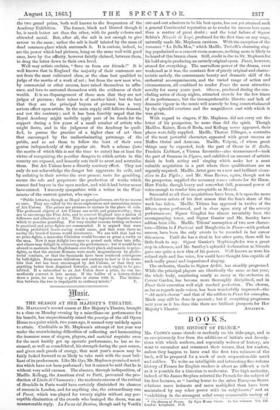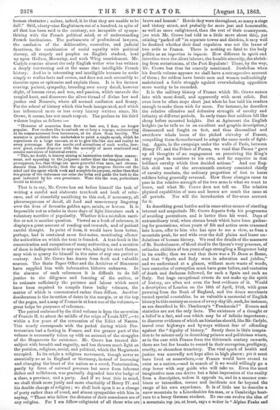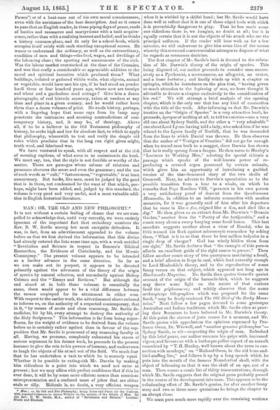BOOKS.
THE HISTORY OF FRANCE.*
Mn. CROWE'S name stands so modestly ou his title-page, and is so conspicuously free from the additions of initials and descrip- tions with which authors, and especially writers of history, are wont to encumber and ornament their names, that few readers, unless they happen to have read the first two volumes of the book, will be prepared for a work of such unquestionable merit and calibre. To write an intelligible and interesting five-volume history of France for English readers is about as difficult a task as it is possible for a historian to undertake. The high authority, indeed, of Sir James Stephen selected the French for the subject of his first lectures, as" having borne to the other European States relations more intimate and more multiplied than have been maintained by any other power with its neighbours ;" end as "exhibiting in the strongest relief every conceivable variety of • The History of France. By Eyre EMS evolve. In five volumes. Vol. London: Longmont. 1803. human character ; unless, indeed, it be that they are unable to be dull." Still, ninety-nine Englishmen out of a hundred, in spite of all that has been said to the contrary, are incapable of sympa- thizing with the French political mind, or of understanding French institutions. The parliaments of professional lawyers, the confusion of the deliberative, executive, and judicial functions, the combination of social equality with political slavery, all stupefy and perplex an English student, bred up upon Hallam, Macaulay, and such Whig nourishment. Mr. 'Carlyle remains almost the only English writer who has written a deeply interesting and at the same time intelligible French history. And he is interesting and intelligible because he seeks simply to realize facts and scenes, and does not seek ostensibly to theorize upon or epitomize and explain them. It is his intense craving, patient, sympathy, brooding over every detail, however slight, of human error, and woe, and passion, which unravels the tangled knot, and discovers the silver thread of divine law and justice and Nemesis, where all seemed confusion and frenzy. For the school of history which this book inaugurated, and which has influenced more or less every history written since, Mr. Crowe, it seems, has not much respect. The preface to his third volume begins as follows :— " Histories of countries from first to last are, I fear, no longer popular. Few readers like to embark on so long a voyage, uninteresting at its commencement from barrenness, at its close from brevity. The narrator is preferred who undertakes to paint a single epoch, which he reproduces on a large canvass, so as to give life-like size and reality to every personage. But the merits and attractions of such works, how- ever great, cannot dispense with the necessity of more continued and concise narratives of historical events. . . ."
"This, no doubt, is history aiming at instruction rather than amuse- ment, and appealing to the judgment rather than the imagination. It presupposes, too, that things are more powerful than men, and circum- stances than individuals ; that the age in its progress throws out the mind and the agent which work and complete its purpose, rather than that the genius of the statesman can seize the helm and guide the bark to the goal indicated by his own prescience. Were this the case, portraiture would be history."
That is to say, Mr. Crowe has set before himself the task of writing a careful and elaborate text-book and book of refer- ence, and of cheerfully sacrificing to this end, if necessary, all picturesqueness of detail, all fond and unnecessary lingering over the lives of favourite golden ages, saints, or heroes. It is impossible not to admire in these days of light literature such a voluntary sacrifice of popularity. Whether it is a mistaken sacri- fice or not is another question. Viewed as a book of reference, it displays a great amount of reading and research, and of patient careful thought. In point of form, it would have been better, perhaps, had it contained more foot-notes, mentioning oftener the authorities on which the text is founded. A text-book is the concentration and comparison of many authorities, and a mention of them is indispensable to any one who, taking his start thence, may wish to quarry for himself in the mine of any one period or century. And Mr. Crowe has drawn from fresh and valuable sources. The State Paper Office and the Archives of Simancas have supplied him with information hitherto unknown. In the absence of such references it is difficult to do full justice to the diligence and learning of the author, or to estimate sufficiently the patience and labour which must have been required to compile three bulky volumes, the matter of which is concentrated rather than diffuse. Another desideratum is the insertion of dates in the margin, or at the top of the pages, and a map of France in at least one of the volumes,— great helps for purposes of reference.
The period embraced by the third volume is from the accession of Francis II. to about the middle of the reign orLouis XIV.,—to within a few years of the revocation of the Edict of Nantes. This nearly corresponds with the period during which Pro- testantism had a footing in France, and the greater part of the volume is necessarily taken up with an account of the struggles of the Huguenots for existence. Mr. Crowe has treated this subject with breadth and sagacity, and has thrown much light on the position, religious, social, and political, which the Huguenots occupied. In its origin a religious movement, though never so essentially so as in England or Germany, instead of leavening and changing the heart of the nation as a creed, Protestantism, partly by force of outward pressure but more from inherent defect and selfishness, was gradually degraded into the badge of a class, a province, and a party. And if we bear this in mind, we shall think more justly and more charitably of Henry IV. and his double change of religion ; we shall look upon it as a change of party rather than of creed, and almost sympathize with him in saying, "Those who follow the dictates of their conscience are of any religion. For I am fellow-religionist of all those who are brave and honest." Heroic they were throughout, as many a siege and victory attest, and probably far more just and honourable, as well as more enlightened, than the rest of their countrymen, (we wish Mr. Crowe had told us a little more about this), yet existing "parked off "in separate towns and districts, it may well be doubted whether their final expulsion was not the lesser of two evils to France. There is nothing so fatal to the body politic as an imperium in imperio. How different in spirit and intention were the silent labours-, the humble sincerity, the shrink- ing from sectarianism, of the Port Royalists ! These, by the way, Mr. Crowe has thus far scarcely mentioned. Doubtless when his fourth volume appears we shall have a retrospective account of them ; for seldom have heroic men and women unflinchingly maintained a futile struggle against overwhelming opposition more worthy to be recorded.
It is the military history of France which Mr. Crowe enters into with most detail, and apparently with most relish. But even here be often stops short just when he has told his readers enough to make them wish for more. For instance, he describes the relative offensive and defensive strength of cavalry and infantry at different periods. In early times foot soldiers fell like sheep before mounted knights. But at Agincourt the English knights (as he tells us in an excellent and graphic description,) dismounted and fought on foot, and thus discomfited and overthrew whole hosts of the picked chivalry of France, compelling them thenceforward to adopt the same mode of fight- ing. Again, in the campaign under the walls of Paris, between Henry IV. and the Prince of Parma, we read that Parma "gave up all thoughts of an engagement on perceiving the King's army equal in numbers to his own, and far superior in that brilliant cavalry which then decided actions." And our Eng- lish civil wars of the seventeenth century consisted chiefly of cavalry combats, the ordinary proportion of foot to horse soldiers being generally reversed. How these changes came to pass in the relative strength of the two arms is what we want to know, and what Mr. Crowe does not tell us. The relative physical capabilities of men and horses are much the same at all periods. Nor will the introduction of fire-arms account for it.
In describing great battles and in some other scenes of startling interest and magnitude Mr. Crowe departs froin his programme of avoiding portraiture, and is better than his word. Days of extraordinary trial, when storms break which have been gather- ing for generations, when years of life and action seem crammed into hours, offer to hint who ha i eyes to see a view, as from a mountain peak, far and wide over the dull plains and lesser un- dulations of human history. We read the details of the massacre of St. Bartholomew, of blood shed in the Queen's very presence, of orthodox children of ten years of age strangling a Huguenot baby in its cradle; then we read that there was a Te Deem at Rome, and that "Spain and Italy were in adoration and jubilee," and we understand at a glance, without more waste of words, how centuries of corruption must have gone before, and centuries of death and darkness followed, for such a Spain and such an Italy. But huge exceptional events do not make up the spirit of history, are often not even the best evidence of it. Would a description of London on the 10th of April, 1848, with guns yawning from the Bank of England, and the douce merchants turned special constables, be as valuable a memorial of English history in this century as scenes of ev ery-day life , such, for instance, as are described in Mr. Thackeray's " Pendennis?" Events and statistics are not the only facts. The existence of a thought or a belief is a fact, and one which may be of infinite importance ; to discover evidence of which an historian should, like Mr. Carlyle, travel over highways and byways without fear of offending against the "dignity of history." Surely there is little tempta- tion to be minute only in describing princes and politicians where, as in the case with France from the thirteenth century onwards, there are but few breaks to record in their corruption, profligacy, cruelty, or shameless treachery. The vital spark of health and justice was assuredly not kept alive in high places ; yet it must have lived on somewhere,—or France would have ceased to exist as a nation,—and in search of it we would willingly go a step lower with any guide who will take us. Even the most imaginative man can derive but a faint impression of the reality front a description, unless it appeals to, and in a manner com- bines or intensifies, scenes and incidents not far beyond the range of his own experience. It is of little use to describe a snow mountain to a Lincolnshire fen-man, or a Cambridge boat- race to a beery German student. No one can evolve the idea of a mountain top (so, at least, says a writer in "Alpine Peaks and Passes") or of a boat-raze out of his own moral consciousness, even with the assistance of the beat description. And so it comes to pass that an English reader, in these piping days of peace, reads of battles and massacres and martyrdoms with a tacit acquies- cence, rather than with a realizing interest and belief; and he thinks a history common-place, and fit only for a school-book, which occupies itself solely with such startling exceptional scenes. He wants to understand the ordinary, as well as the extraordinary, condition of men and things—the food, wages, and dwellings of the labouring class; the sporting and amusements of the rich. Was the labour market overstocked at the time of the Crusades, and was that really a considerable or appreciable addition to the moral and spiritual incentive which produced them? What buildings, isolated or gathered within walls, what objects, animal or vegetable, would have met his eye, if he had stood on yonder knoll three or four hundred years ago, where now are turnips and wheat and a gardenless mud cottage ? Give him a dozen photographs, of real historic acpuracy, taken at random at any time and place in a given century, and he would rather have them than a dozen volumes of print. He reads history, perhaps, with a lingering -hope that some rays front its lamp may penetrate the intricacies and seeming contradictions of con- temporary history, and, it may be, of theology. Above all, if he be a believer in the Old Testament philosophy of history, he seeks high and low for absolute fact, to which to apply that philosophy, wherewith to test and verify the simple old rules which proclaim that in the long run right gives might, truth weal, and falsehood woe.
We have ventured to speak, with all respect and at the risk of seeming captious, of what seem to us omissions in the book. We must say, too, that the style is not forcible or worthy of the matter. There are passages where misuse of relatives and pronouns obscures the sense and even the grammar ; and the use of such words as "cult," " fastuousness," "regrettable," is at least unnecessary. But books, like men, must be judged by the good that is in them, not condemned for the want of that which, per- haps, might have been added, and, judged by this standard, the volume is very good and very useful, and a most valuable addi- tion to English historical literature.
































 Previous page
Previous page